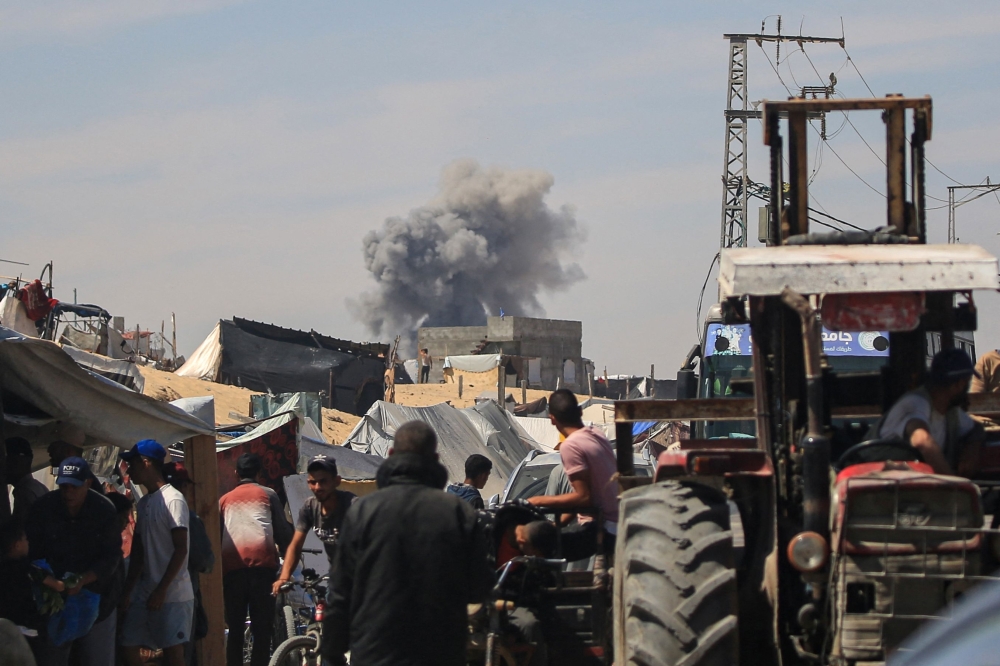Israel pummels civilian pushing into Rafah
Published: 07:05 PM,May 31,2024 | EDITED : 11:05 PM,May 31,2024


Smoke billows following Israeli bombardment as displaced Palestinians walk in Rafah. — AFP
RAFAH: Israeli forces on Friday struck across the Gaza Strip, with witnesses reporting air raids around the southern city of Rafah, the latest focus of the nearly eight-month war.
Israel launched its military incursion into Rafah in early May despite international objections over the safety of civilians sheltering in the city on Gaza's border with Egypt. Witnesses said on Friday Israeli strikes hit the Rafah area as well as central Gaza's Nuseirat, and a correspondent reported intense bombardment in the north.
Strikes on two separate locations killed a total of 11 people overnight, medical sources at a hospital in Deir al-Balah and the Nuseirat refugee camp reported. The Israeli military said its forces were 'operating in central Gaza', where it earlier announced forces had found rocket launchers, weapons and 'tunnel shafts'.
Israel said on Wednesday its forces had taken over the 14-kilometre Philadelphi corridor along the Gaza-Egypt border, where it alleges weapons were being smuggled. Egypt, a longtime mediator in the conflict, has yet to officially comment on the Israeli takeover, which officials have previously said could violate the two countries' 1979 peace deal.
Amid stalled diplomatic efforts towards a ceasefire, Palestinian Hamas said it had informed mediators it would only agree a 'comprehensive' truce agreement including a captives-prisoner swap if Israel halts its 'aggression'.
Before the Rafah offensive began, the United Nations said up to 1.4 million people were sheltering in the city. Since then, one million have fled the area, the UN agency for Palestinian refugees, UNRWA, has said.
The United Nations has warned of looming famine in Gaza. The Israeli seizure of the Rafah crossing has further slowed sporadic deliveries of aid for Gaza's 2.4 million people and effectively shuttered the territory's main exit point.
Cyprus, the European Union's easternmost member, said humanitarian aid shipped to Gaza was being kept at sea off the territory's coast, after a US-built pier was damaged in bad weather.
Cypriot government spokesman Konstantinos Letymbiotis said on Friday the maritime corridor was 'uninterrupted' and the pier would be 'back on track' within days. 'Our goal... is to be able to help half a million people per month, and we think that this goal is achievable,' he said. Israel's retaliatory offensive has killed at least 36,224 people in Gaza, mostly civilians, according to the territory's health ministry.
After the strike, Algeria presented a draft resolution to the UN Security Council demanding an immediate ceasefire and the release of all captives, but it was unclear when it would be voted on.
Israel launched its military incursion into Rafah in early May despite international objections over the safety of civilians sheltering in the city on Gaza's border with Egypt. Witnesses said on Friday Israeli strikes hit the Rafah area as well as central Gaza's Nuseirat, and a correspondent reported intense bombardment in the north.
Strikes on two separate locations killed a total of 11 people overnight, medical sources at a hospital in Deir al-Balah and the Nuseirat refugee camp reported. The Israeli military said its forces were 'operating in central Gaza', where it earlier announced forces had found rocket launchers, weapons and 'tunnel shafts'.
Israel said on Wednesday its forces had taken over the 14-kilometre Philadelphi corridor along the Gaza-Egypt border, where it alleges weapons were being smuggled. Egypt, a longtime mediator in the conflict, has yet to officially comment on the Israeli takeover, which officials have previously said could violate the two countries' 1979 peace deal.
Amid stalled diplomatic efforts towards a ceasefire, Palestinian Hamas said it had informed mediators it would only agree a 'comprehensive' truce agreement including a captives-prisoner swap if Israel halts its 'aggression'.
Before the Rafah offensive began, the United Nations said up to 1.4 million people were sheltering in the city. Since then, one million have fled the area, the UN agency for Palestinian refugees, UNRWA, has said.
The United Nations has warned of looming famine in Gaza. The Israeli seizure of the Rafah crossing has further slowed sporadic deliveries of aid for Gaza's 2.4 million people and effectively shuttered the territory's main exit point.
Cyprus, the European Union's easternmost member, said humanitarian aid shipped to Gaza was being kept at sea off the territory's coast, after a US-built pier was damaged in bad weather.
Cypriot government spokesman Konstantinos Letymbiotis said on Friday the maritime corridor was 'uninterrupted' and the pier would be 'back on track' within days. 'Our goal... is to be able to help half a million people per month, and we think that this goal is achievable,' he said. Israel's retaliatory offensive has killed at least 36,224 people in Gaza, mostly civilians, according to the territory's health ministry.
After the strike, Algeria presented a draft resolution to the UN Security Council demanding an immediate ceasefire and the release of all captives, but it was unclear when it would be voted on.
